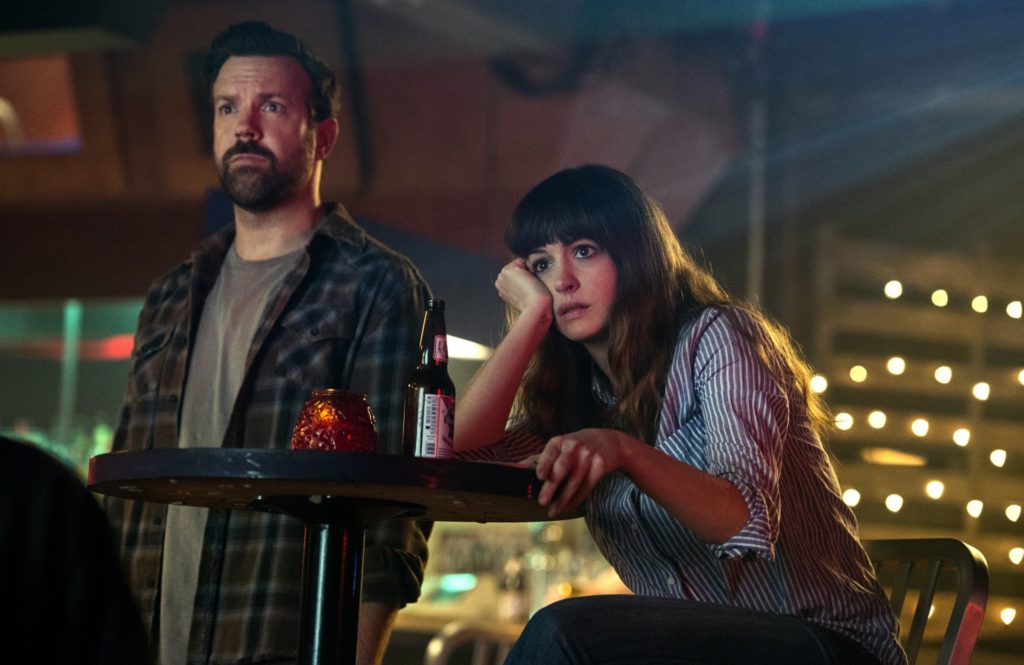
My boyfriend and I have a Saturday night tradition. We have a nice, home-cooked meal and afterward we watch a movie. Whether it’s a classic or a new one doesn’t matter — the only requirement is that it provide a satisfying cinematic experience. When the lights come on, you’re more than amused or distracted, you’re a little dazed, a little wobbly, and still immersed in that alternate reality the story created. One such movie was the Anne Hathaway-Jason Sudeikis vehicle “Colossal” from 2016, written and directed by Nacho Vigalondo. Every plot twist defied my expectations. What at first seemed like a sci-fi version of a rom com subverted genre conventions and turned out to be a deep exploration into this often-problematic genre. If you haven’t watched it yet, there are plot spoilers ahead, so you might want to read this after screening it.
Gloria (Anne Hathaway) is a party girl and former writer who goes on one last drug-fueled bender, causing her exasperated boyfriend to kick her out of their apartment in the city. Unemployed, homeless and broke, she moves back to her parents’ empty house in her old hometown. She runs into her childhood friend Oscar (Jason Sudeikis). It is immediately apparent to the audience that Oscar harbors a long-time crush on Gloria. And while she’s not exactly oblivious, it’s obvious the feeling is not mutual. Over drinks at Oscar’s bar their friendship is rekindled and he gives her a job waiting tables. And here comes the first twist: The next morning, Gloria wakes up to the news that a colossal monster has attacked Seoul overnight. What’s more, thanks to a telltale tic, Gloria soon realizes the monster is her avatar.
So far the story has all the elements for a familiar Hollywood story, albeit with a sci-fi twist: girl hits bottom, must go home to pick up the pieces, discovers her alcoholism turns her into a homicidal Partygirlzilla, and starts putting herself together with the help of her childhood friend, now a blandly handsome nice guy. By the time the end credits roll, the monster would have been vanquished, Gloria would discover her own latent feelings for Oscar and they’d go off into the sunset. Not a bad mash-up of genres, right? But filmmaker Vigalondo has other plans.
Gloria shares her discovery with Oscar and his buddies. What’s more, Oscar too has a destructive avatar, a gigantic toy robot. One night he ends up joining her in a destructive spree in downtown Seoul. Gloria’s conscience kicks in and, aware that somehow her alcoholism is actually killing real people, she decides to go cold-turkey on her own. At around the same time, Gloria has a one-night stand with Oscar’s dimwitted buddy. And that’s when Vigalondo wreaks havoc on the romcom formula: Oscar finds out and, in a jealous rage, he goes into a solo rampage in Seoul. Worse yet, when Gloria tries to stop him from going into another destructive bent as the colossal robot, he strikes her. In real life. She hits him back. In a shocking scene, they go at it each other, pulling no punches. And while he apologizes the following day, he soon begins to use his ability to turn into a monster as a way of punishing and manipulating Gloria for her indifference.
As my boyfriend pointed out, what at first blush was a neat reboot of a romcom turns out to be a fresh and cinematic exploration of male sexual entitlement: “It’s about the real anger that men feel when an attractive woman rejects them.” There’s a dark underside to Oscar’s supposed “nice guy” persona. While he gives her a job and casually drops off gifts she sorely needs, his solicitousness isn’t pure — he’s tallying it all in his head and expecting a payoff in the form of love requited. And whatever Gloria’s faults, — and there are many–, at no point does she encourage any of this. She’s never portrayed as using her feminine wiles against Oscar. Oscar’s expectations are unfounded and, unlike Gloria, he doesn’t care if his rage causes the deaths of innocents. If anything, he holds it over Gloria’s head to manipulate her, regardless of what she feels. But Gloria doesn’t budge and he spins further out of control. In the end, Gloria’s revenge is unexpected and, just like she kicked her alcoholism alone, she does it on her own.
In an era in which incels are actually going on shooting sprees to avenge their thwarted sexual and romantic expectations, “Colossal” is a fresh and cinematic take on a Hollywood trope that contributed to that misplaced — and violent — male entitlement.
